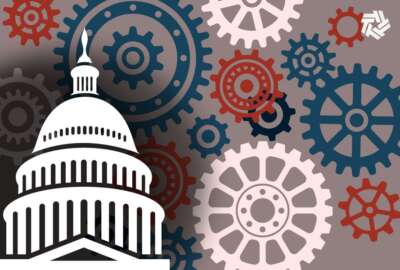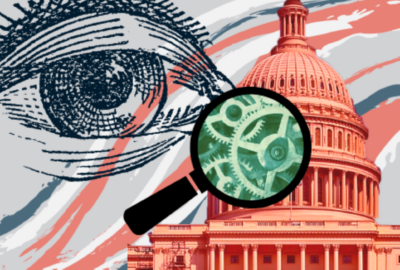IG backs legislation to keep important oversight tool alive
As an acute threat, the pandemic departed a couple of years ago. The Pandemic Response Accountability Committee (PRAC) has another 18 months to do the same.
As an acute threat, the pandemic departed a couple of years ago. The Pandemic Response Accountability Committee (PRAC) has another year and a half to do the same. The PRAC is scheduled to sunset in September 2025. A bipartisan Senate bill would help the government retain the data analytics platform so it would still be available to inspectors general. For why this matters, the Federal Drive with Tom Temin talked with Justice Department Inspector General and PRAC Chairman Michael Horowitz.
Interview Transcript:
Tom Temin And let’s begin with the PRAC assets. What does it possess that should be preserved here?
Michael Horowitz There are a few things. First of all, the most important asset, of course, of any organization is its people. And we’ve been able to assemble a tremendously talented group of people, particularly in the analytic space, among all the different responsibilities we have. We were given unique hiring authorities by Congress when the pandemic hit. So, we’ve brought on a wide range of statisticians, analysts, people with great statistical skills who’ve helped us build this analytics platform, which is our other most important asset beyond our people, is this effort to get data from across the federal government on the pandemic. So, your listeners know, there were over 400 programs set up in the various relief bills that Congress passed involving $5 trillion. That’s with a T. 5 trillion. It’s hard to believe, and we learned pretty quickly the only way you can do effective oversight, over $5 trillion of spending is with analytics.
Tom Temin Right? So, there is an analytics piece of software somewhere hosted somewhere that belongs to the PRAC as a temporary committee.
Michael Horowitz Right. In 2021, Congress gave us funding to build this analytics platform, which we created. We’ve developed we’ve brought in a range of data into it for these various pandemic programs. We’ve also entered into agreements with various agencies so we could get additional data from them, so that we could look to find where the hundreds of billions of dollars in fraud occurred, and make sure we can track down the wrongdoers on the one hand. On the other hand, also understand and look at the systemic issues that occurred here, which is obviously a very important part of what we’ve been doing as well.
Tom Temin So this bill that has the backing of a couple of senators, I think Mitt Romney is on the Republican side.
Michael Horowitz And the Chairman Peters on the Democratic side, as well as Senator Lankford.
Tom Temin And it would do what exactly?
Michael Horowitz So we are scheduled to sunset the Pandemic Response Accountability Committee in September of next year. What the bill would do is, first of all, extend the existence of the PRAC beyond that. It would change the name to the Government Spending Oversight Committee, and it would allow us to keep the analytics platform to not only look at pandemic spending, continuing to look at pandemic spending, but also expand it to cover other programs as well, so that we could broaden its use. And keep in mind, the statute of limitations for pandemic fraud was extended by Congress for small business-related fraud to ten years. So, we’re scheduled to sunset a little more than five years since the CARES act was passed in March 2020, but the prosecutors and investigators are allowed to pursue the fraud until at least 2030.
Tom Temin So if this bill would become law, then it’s almost as if the PRAC would become a small independent agency in some ways.
Michael Horowitz So we would stay as part of the IG Council, but as a different committee and an operational committee, if you will. So, this would be an operational arm of the IGs that would allow us to assist all of the IGs as they pursue fraud in other areas beyond the pandemic.
Tom Temin Because the analytical platform, I guess, is agnostic as to what program or spending that it covers. Fair to say.
Michael Horowitz That’s correct. I mean, we could be using this for any purpose. And what we are looking to do and what the bill would allow us to do is use it to prevent fraud. One of the things we’ve been able to use it to demonstrate to policymakers is how agencies could have taken steps, and how Congress could have taken steps to put in place stronger controls to prevent the fraud before it occurred.
Tom Temin Sure. We’re speaking with Michael Horowitz, Inspector general at the Justice Department and chair of the Pandemic Response Accountability Committee. And we’ve been through this before because the spending for the 2008 Housing Financial Relief, a mechanism was created and it was disbanded, and I believe early on PRAC said, I wish we had what they had built in 2008. So, in some ways, it sounds like this is an effort to prevent that from happening.
Michael Horowitz That’s exactly right, Tom. When I became chair of the current committee, one of the first things. I did was reach back out to the folks who ran the Recovery and Accountability Transparency Board, which was created to oversee the funding during the financial crisis in 2008-9, going forward. One of the things they built was something called the ROC the Recovery Operation Center, an analytics platform that was tremendously valuable. When I became an inspector general in 2012, I was on this recovery board and I saw it work well when 2015 came around and the recovery board was scheduled to sunset, just like we’re scheduled to sunset, we as IGs, the Comptroller General, Gene Dodaro, went to Congress and said and to the administration and said you should keep this analytics platform. In fact, GAO has a report out there in 2015 your readers can find on the GAO’s website that lays out the case for it. Unfortunately, neither the administration nor Congress did that. Fast forward five years later, the pandemic hits. We don’t have an analytics platform, and Congress has to invest $40 million in 2021 to have us rebuild it.
Tom Temin Only the memory of Earl Devaney to try to inspire you, but not the money. You’re the platform. You had the money, but not the platform.
Michael Horowitz Not only the memory of real. I had a chance to talk to Earl about it. He gave me the download on what worked and how it worked.
Tom Temin And in this case, the funding came fairly late in the whole effort because the CARES act was 2020. Trillions had gone out by the formation of the track and the funding in 2021 until you got it built. Really, the hogs had escaped the barn door.
Tom Temin You know, in 2020 when the CARES act was passed. Agencies decided they want to get the money out as quickly as they could because of the pandemic, with essentially no guardrails. It was just get the money out. And what happened, not surprisingly, is there were hundreds of billions of dollars in fraud as well as improper payments, which we shouldn’t forget. We found billions of dollars went to deceased individuals, for example, that could have easily been identified had agencies simply taken a little bit of time. We put out a fraud alert in early 2022 that went through and identified how billions of dollars in payments could have been stopped, had something as simple as taking the applications and asking the Social Security Administration, are these real Social Security numbers? Do these match the names and date of birth in your system? We did that.
Tom Temin That’s a ten second match running basically.
Michael Horowitz Right. We sent them 2.7 million pieces of information from PPP Payroll Protection Plan, SBA program related applications, 2.7 million. Within two weeks, we had the answers back, identifying over 100,000 applications that had incorrect information in them that didn’t match what the government already knew about.
Tom Temin And by the way, what’s the current status of PRAC activity? Are you still working the platform, the staff still getting data and looking for things?
Michael Horowitz We are still working. We are doing a couple of things. First of all, we’re writing a playbook for Congress, for the administration, for policymakers going forward on what worked, what didn’t work. How do you go forward? Hopefully, we don’t have another pandemic for another 100 plus years, but we’re going to have emergency spending. We’re going to have hurricanes, earthquakes, you know, fires, all the things that need assistance. And we’re writing a playbook for Congress and the administration, so they know what worked, what didn’t work. And we can hopefully prevent some of what was easily preventable here. That’s one thing. Secondly, we’re going to continue to go after the fraudsters. We are not going to, as I often say, we’re not going to let crime pay. We can’t have that happen. We’re working closely with the Justice Department. We’re working with over 40 law enforcement agencies to go after this fraud, and no one who committed fraud should rest comfortably at this point, just because people have started to move on from the pandemic.
Tom Temin But didn’t a lot of this fraud actually originate outside the United States? Is it beyond our reach at this point?
Michael Horowitz It’s not beyond our reach, but in fact, it is among the hardest to track down and follow up on because you need to work with your foreign counterparts. I actually was meeting just two weeks ago with my counterpart from the United Kingdom on some of the same challenges and issues and comparing notes with them, and we’re going to keep pursuing it. In fact, the Justice Department itself has been strongly supportive of keeping us in business because they need to be able to use our analytics platform to chase these funds. We’re supporting almost 800 cases involving $2 billion plus in fraud, our analytics platform.
Tom Temin Wow. So, you envision then the PRAC capabilities continuing is almost a service bureau for the IG community via SIGGI.
Michael Horowitz Exactly right. That is exactly how we’re trying to structure it, as well as when fraud does occur. Agencies like the Secret Service, the FBI and others state local law enforcement who are pursuing these cases. When fraud does occur, we want to work with the IGS to help them identify both programmatic issues and systemic issues. Individual issues. But we also, very importantly, are working with OMB to understand how this can be used to prevent fraud. Prevent improper payments before they occur. Because all of us know we’re in this business that once the money goes out the door. You’re lucky if you can get even close to 10% of it back. It’s not even going to come close to that ultimately.
Tom Temin Right? So, the key word is not claw back, but prevention. Really.
Michael Horowitz Absolutely.
Tom Temin You’ll have it ahead of the next type of crisis.
Michael Horowitz Exactly right. We have it in place first. You don’t spend hundreds of billions of dollars, trillions of dollars in this case and then come up and say, let’s figure out what happened.
Copyright © 2025 Federal News Network. All rights reserved. This website is not intended for users located within the European Economic Area.
Tom Temin is host of the Federal Drive and has been providing insight on federal technology and management issues for more than 30 years.
Follow @tteminWFED






